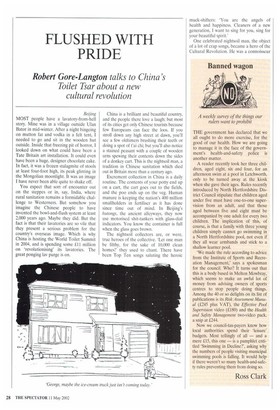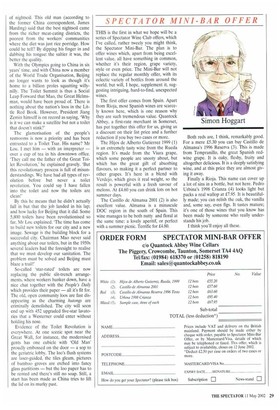FLUSHED WITH PRIDE
Robert Gore-Langton talks to China's
Toilet Tsar about a new cultural revolution
Beijing MOST people have a lavatory-from-hell story. Mine was in a village outside Ulan Bator in mid-winter. After a night bingeing on mutton fat and vodka in a felt tent, I needed to go and sit in the wooden hut outside. Inside that freezing pit of horror, I looked down on what could have been a Tate Britain art installation. It could even have been a huge, designer chocolate cake. In fact, it was a frozen stalagmite of stools at least four-foot high, its peak glinting in the Mongolian moonlight. It was an image I have never been able quite to shake off.
You expect that sort of encounter out on the steppes or in, say, India, where rural sanitation remains a formidable challenge to Westerners. But somehow you imagine the Chinese people to have invented the bowl-and-flush system at least 2,000 years ago. Maybe they did. But the fact is that their lavatories are so vile that they present a serious problem for the country's overseas image. Which is why China is hosting the World Toilet Summit in 2004, and is spending some £11 million on 'revolutionising' its lavatories. The great ponging lay purge is on. China is a brilliant and beautiful country, and the people there love a laugh; but most of its cities get only Chinese tourists because few Europeans can face the loos. If you stroll down any high street at dawn, you'll see a few oldtimers brushing their teeth or doing a spot of t'ai chi; but you'll also notice a stained peasant with a couple of wooden urns spewing their contents down the sides of a donkey cart. This is the nightsoil man, a tradition in Chinese sanitation which died out in Britain more than a century ago.
Excrement collection in China is a daily routine. The contents of your potty end up on a cart, the cart goes out to the fields, and the poo ends up on the veg. Human manure is keeping the nation's 400 million smallholders in fertiliser as it has done since time out of mind. In Beijing's hutongs, the ancient alleyways, they now use motorised shit-tankers with glass-dial indicators. You know the container is full when the glass goes brown.
The nightsoil collectors are, or were, true heroes of the collective. 'Let one man be filthy, for the sake of 10,000 clean homes!' they used to chant. There have been Top Ten songs saluting the heroic muck-shifters: 'You are the angels of health and happiness. Cleaners of a new generation, I want to sing for you, sing for your beautiful spirit.'
One celebrated nightsoil man, the object of a lot of crap songs, became a hero of the Cultural Revolution. He was a connoisseur of nightsoil. This old man (according to the former China correspondent, James Harding) said that the best nightsoil came from the richer meat-eating districts, the poorest from the workers' communities where the diet was just rice porridge. How could he tell? By dipping his finger in and dabbing his tongue: the saltier it was, the better the quality.
With the Olympics going to China in six years' time, and with China now a member of the World Trade Organisation, Beijing no longer wants to look as though it's home to a billion proles squatting willynilly. The Toilet Summit is thus a Social Leap Forward that Mao, the Great Helmsman, would have been proud of. There is nothing about the nation's loos in the Little Red Book. However, President Jiang Zemin himself is on record as saying, 'Why is it we can make a satellite but not a toilet that doesn't stink?'
The glamorisation of the people's restrooms is now a priority and has been entrusted to a Toilet Tsar. His name? Mr Lou. I met him — with an interpreter — over a cup of tea in his downtown office. 'They call me the father of the Great Toilet Revolution,' he explained gravely. 'But this revolutionary process is full of misunderstandings. We have had all types of revolution before but never a toilet revolution. You could say I have fallen into the toilet and now the toilets are clean!'
By this he means that he didn't actually fall in but that the job landed in his lap; and how lucky for Beijing that it did. Some 5,800 toilets have been revolutionised so far, Mr Lou explained. The time has come to build new toilets for our city and a new image. Sewage is the building block for a successful city. Chairman Mao never said anything about our toilets, but in the 1950s several leaders had the foresight to realise that we must develop our sanitation. The problem must be solved and Beijing must blaze a trail!'
So-called `star-rated' toilets are now replacing the public slit-trench arrangements, where workers hunker down, have a nice chat together with the People's Daily which provides their paper — all it's fit for. The old, open community loos are fast disappearing as the charming hutongs are criminally demolished. The city will soon end up with 452 upgraded five-star lavatories that a Westerner could enter without holding his nose.
Evidence of the Toilet Revolution is everywhere. At one scenic spot near the Great Wall, for instance, the modernised gents has one cubicle with 'Old Man' proudly embossed on the door — a sop to the geriatric lobby. The loo's flush systems are laser-guided, the tiles gleam, pictures of bamboo groves are etched into fancy glass partitions — but the loo paper has to be rented and there's still no soap. Still, a start has been made as China tries to lift the lid on its murky past. THIS is the first in what we hope will be a series of Spectator Wine Club offers, which I've called, rather tweely you might think, the Spectator Mini-Bar. The plan is to offer wines which, apart from being excellent value, all have something in common, whether it's their region, grape variety, style or even price. The Mini-Bar will not replace the regular monthly offer, with its eclectic variety of bottles from around the world, but will, I hope, supplement it, suggesting intriguing, hard-to-find, unexpected wines.
The first offer comes from Spain. Apart from Rioja, most Spanish wines are scarcely known here, which is one reason why they are such tremendous value. Quantock Abbey, a first-rate merchant in Somerset, has put together this offer for us, giving us a discount on their list price and a further reduction if you buy two cases or more.
The Hijos de Alberto Gutierrez 1999 (1) is an extremely tasty wine from the Rueda region. It's made from the Viura grape, which some people are snooty about, but which has the great gift of absorbing flavours, so making it a perfect partner to other grapes. It's here in a blend with Verdejo, which gives it real weight, so the result is powerful with a fresh savour of melons. At £4.60 you can drink lots on hot summer days.
The Castillo de Almansa 2001 (2) is also excellent value. Almansa is a minuscule DOC region in the south of Spain. This wine manages to be both nutty and floral at the same time: a lovely aperitif, or perfect with a summer picnic. Terrific for £4.80. Both reds are, I think, remarkably good. For a mere £5.30 you can buy Castillo de Almansa's 1996 Reserva (3). This is made from Tempranillo, the great Spanish redwine grape. It is oaky, fleshy, fruity and altogether delicious. It is a deeply satisfying wine, and at this price they are almost giving it away.
Finally a Rioja. This name can cover up a lot of sins in a bottle, but not here. Pedro Urbina's 1998 Crianza (4) looks light but packs a real wallop at £7.95. It is beautifully made; you can relish the oak, the vanilla and, some say, even figs. It tastes mature; it's one of those wines that you know has been made by someone who really understands his job.
I think you'll enjoy all these.







































































 Previous page
Previous page